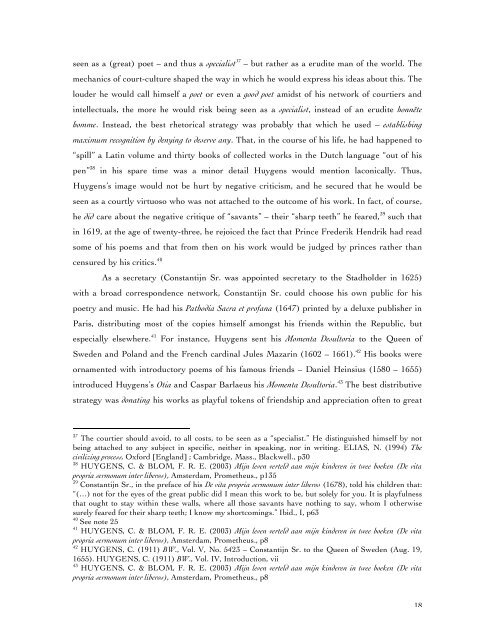Christiaan Huygens – A family affair - Proeven van Vroeger
Christiaan Huygens – A family affair - Proeven van Vroeger
Christiaan Huygens – A family affair - Proeven van Vroeger
Create successful ePaper yourself
Turn your PDF publications into a flip-book with our unique Google optimized e-Paper software.
seen as a (great) poet <strong>–</strong> and thus a specialist 37 <strong>–</strong> but rather as a erudite man of the world. The<br />
mechanics of court-culture shaped the way in which he would express his ideas about this. The<br />
louder he would call himself a poet or even a good poet amidst of his network of courtiers and<br />
intellectuals, the more he would risk being seen as a specialist, instead of an erudite honnête<br />
homme. Instead, the best rhetorical strategy was probably that which he used <strong>–</strong> establishing<br />
maximum recognition by denying to deserve any. That, in the course of his life, he had happened to<br />
“spill” a Latin volume and thirty books of collected works in the Dutch language “out of his<br />
pen” 38 in his spare time was a minor detail <strong>Huygens</strong> would mention laconically. Thus,<br />
<strong>Huygens</strong>’s image would not be hurt by negative criticism, and he secured that he would be<br />
seen as a courtly virtuoso who was not attached to the outcome of his work. In fact, of course,<br />
he did care about the negative critique of “sa<strong>van</strong>ts” <strong>–</strong> their “sharp teeth” he feared, 39 such that<br />
in 1619, at the age of twenty-three, he rejoiced the fact that Prince Frederik Hendrik had read<br />
some of his poems and that from then on his work would be judged by princes rather than<br />
censured by his critics. 40<br />
As a secretary (Constantijn Sr. was appointed secretary to the Stadholder in 1625)<br />
with a broad correspondence network, Constantijn Sr. could choose his own public for his<br />
poetry and music. He had his Pathodia Sacra et profana (1647) printed by a deluxe publisher in<br />
Paris, distributing most of the copies himself amongst his friends within the Republic, but<br />
especially elsewhere. 41 For instance, <strong>Huygens</strong> sent his Momenta Desultoria to the Queen of<br />
Sweden and Poland and the French cardinal Jules Mazarin (1602 <strong>–</strong> 1661). 42 His books were<br />
ornamented with introductory poems of his famous friends <strong>–</strong> Daniel Heinsius (1580 <strong>–</strong> 1655)<br />
introduced <strong>Huygens</strong>’s Otia and Caspar Barlaeus his Momenta Desultoria. 43 The best distributive<br />
strategy was donating his works as playful tokens of friendship and appreciation often to great<br />
37 The courtier should avoid, to all costs, to be seen as a “specialist.” He distinguished himself by not<br />
being attached to any subject in specific, neither in speaking, nor in writing. ELIAS, N. (1994) The<br />
civilizing process, Oxford [England] ; Cambridge, Mass., Blackwell., p30<br />
38 HUYGENS, C. & BLOM, F. R. E. (2003) Mijn leven verteld aan mijn kinderen in twee boeken (De vita<br />
propria sermonum inter liberos), Amsterdam, Prometheus., p135<br />
39 Constantijn Sr., in the preface of his De vita propria sermonum inter liberos (1678), told his children that:<br />
“(…) not for the eyes of the great public did I mean this work to be, but solely for you. It is playfulness<br />
that ought to stay within these walls, where all those sa<strong>van</strong>ts have nothing to say, whom I otherwise<br />
surely feared for their sharp teeth; I know my shortcomings.” Ibid., I, p63<br />
40 See note 25<br />
41 HUYGENS, C. & BLOM, F. R. E. (2003) Mijn leven verteld aan mijn kinderen in twee boeken (De vita<br />
propria sermonum inter liberos), Amsterdam, Prometheus., p8<br />
42 HUYGENS, C. (1911) BW., Vol. V, No. 5423 <strong>–</strong> Constantijn Sr. to the Queen of Sweden (Aug. 19,<br />
1655). HUYGENS, C. (1911) BW., Vol. IV, Introduction, vii<br />
43 HUYGENS, C. & BLOM, F. R. E. (2003) Mijn leven verteld aan mijn kinderen in twee boeken (De vita<br />
propria sermonum inter liberos), Amsterdam, Prometheus., p8<br />
18


